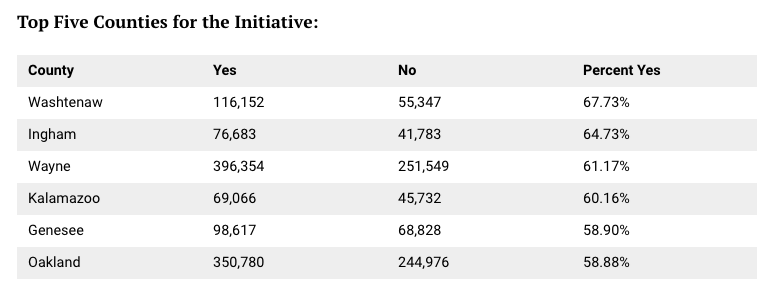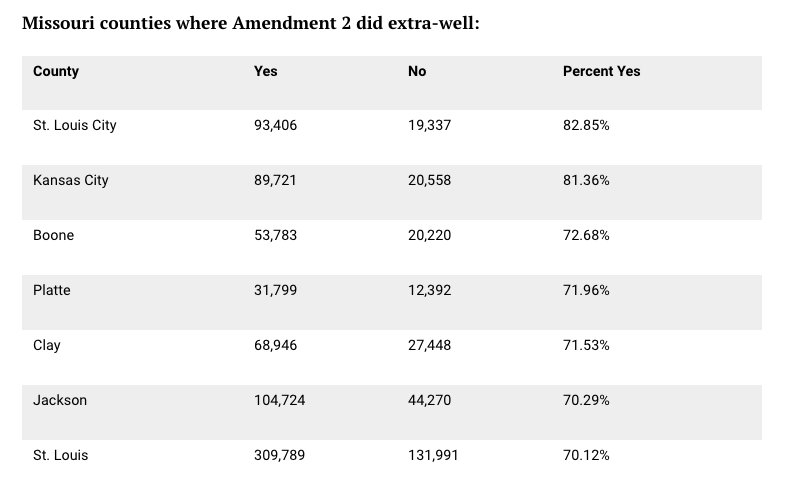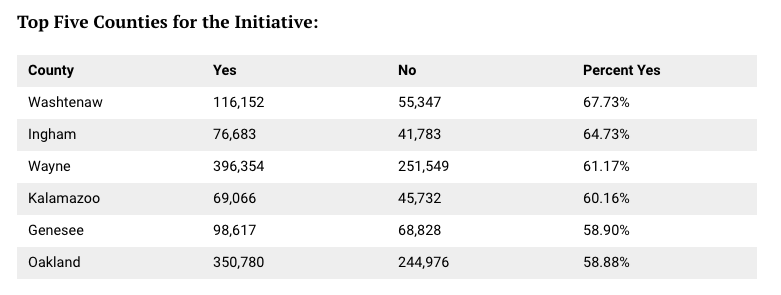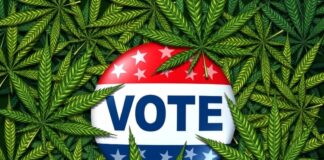Marijuana initiatives passed in three out of the four states where they were put before voters on Tuesday. A new Marijuana Moment analysis shows that in many cases these cannabis proposals did better than other ballot measures or candidates for major office who appeared on the same ballot.
Michigan
In Michigan, 55.9 percent of voters approved the state’s measure to legalize marijuana. That amounts to 2,339,672 votes.
Marijuana legalization got more votes than the winning candidate for governor, Democrat Gretchen Whitmer, who received 53.34 percent of the vote, or (2,256,700 votes). The measure also got more votes than incumbent Democratic U.S. Sen. Debbie Stabenow, who got 2,195,601 votes, or 52.2 percent. Obviously, legal marijuana also garnered more support than the Republican candidates who lost to Whitmer and Stabenow.
More people approved of cannabis than they did the winning attorney general candidate, Democrat Dana Nessel, who will need to carry out cannabis regulations — and potentially defend them from any federal interference. Losing Republican candidate Tom Leonard, who opposed the initiative but said he would uphold it if elected, got 435,000 fewer votes than legal cannabis did.
Voter turnout in the state was up significantly from 2014. In the last two midterm elections, about 3.2 million votes were cast; 4.3 million votes were reported in this year’s election. That’s about 55.4 percent of the voting age population, or 14 points higher than in 2014, and close to general election levels, which were 4.8 million votes in 2016.
The total yes and no votes on Proposal 1 were higher than the totals for either Proposal 2 (anti-gerrymandering) or Proposal 3 (electoral reforms) on the same ballot, though those proposals had more definitive “yes” votes, which implies that Michiganders overall had stronger opinions on marijuana than those other issues.

From Marijuana Moment.
Missouri
In Missouri, where there were three competing medical marijuana initiatives on the ballot, only one passed, coming out far ahead of the other two proposals, which were largely opposed by activists in the cannabis reform movement.
The winning measure, Amendment 2, was approved by 66 percent of voters, or 1,572,592 votes.
The initiative got 824,615 more votes than competing cannabis measure Amendment 3 and 541,221 more than Proposition C, another medical marijuana proposal.
Compared with other issues on the ballot, the successful marijuana question got 113,016 more votes than Amendment 1 (redistricting and campaign finance reform), 84,224 more than Proposition B (minimum wage hike) and 470,762 more than Proposition D (a gas tax hike).
Amendment 2 also got 326,860 more votes than Josh Hawley, the Republican winner of the U.S. Senate race who defeated Democratic incumbent Claire McCaskill by winning 51.4 percent of the vote.
Missouri had 57.9 percent turnout, blowing the 2014 midterm turnout of 35 percent out of the water.

From Marijuana Moment
North Dakota
A total of 329,086 people turned out to vote in North Dakota. While the measure to fully legalize cannabis lost, it garnered 131,585 votes, or 40.5 percent of the vote, and did better than losing candidates in several races.
Marijuana got more votes than losing Democrats: congressional contender Mac Schneider , got 113,891 votes, or 35.6 percent, of the vote; Secretary of State candidate Josh Boschee got 119,983 votes, or 39.2 percent; or Attorney General candidate David Clark Thompson, who got 102,407 votes, or 32.2 percent.
In short, it seems that the state’s voters favor legal marijuana more than they favor Democrats.
There were four counties where the measure did get a majority of votes. In Sioux County, 71 percent of voters (994) selected yes. In Rolette, 2,891 voted yes (58 percent); and in Benson, 1,153 supported the measure (51.3 percent). In Cass County, where Fargo is located, the measure passed by 50.8 percent. And in Grand Forks County, the measure outdid the state-wide percentage rate, with 46.7 percent of voters (12,976) approving the initiative.
Utah
In Utah, where there are still a relatively substantial number of ballots yet to be counted, Proposition 2 to legalize and regulate medical marijuana has so far received 407,943 votes, or 53 percent. That is just barely more votes than Proposition 3 for Medicaid expansion, which received 407,596 votes. Proposition 4 regarding independent redistricting received 371,614 votes, or 36,329 fewer than Proposition 2.
It received substantially more support than losing Democratic U.S. Senate candidate Jenny Wilson, who got 241,951 votes, but came roughly 70,000 votes shy of Republican winner Mitt Romney.
In a county-by-county breakdown, the number of people voting for Proposition 2 was greater than the number voting for the House of Representatives winner in several counties, though there is no data yet available showing how individual congressional districts voted on the medical cannabis measure.
Preliminary voter turnout in Utah was estimated about 54.7 percent at 5 PM on election day, far surpassing the last midterm turnout of 46.3 percent of registered voters.

From Marijuana Moment.
In all four states, more people voted for the marijuana initiatives than supported Democratic presidential candidate Hillary Clinton in 2016, Weedmaps reported. And Michigan’s marijuana legalization ballot measure got more votes than President Trump did in the state that year.
This article has been republished from Marijuana Moment under a content syndication agreement. Read the original article here.











